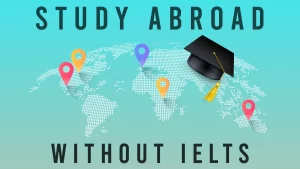Last Updated on August 6, 2025
Studying abroad is more than just attending classes in a foreign country—it’s a transformative journey that enhances personal growth, opens up global career opportunities, and provides unparalleled international exposure. Whether you’re a recent high school graduate, a college student, or a working professional pursuing higher education, studying abroad can give you a competitive edge in today’s global economy.
Broaden Your Horizons Through Global Exposure
One of the most compelling reasons to study abroad is the chance to experience life outside your comfort zone. You immerse yourself in a new culture, explore diverse perspectives, and build a deeper understanding of global issues.
By stepping outside your familiar surroundings, you:
- Gain international exposure
- Develop a global mindset
- Learn to appreciate diverse viewpoints
Access World-Class Education and Diverse Learning Styles
Studying abroad allows you to access high-ranking universities and educational systems that may offer different teaching methodologies than your home country. Whether it’s research-based learning, hands-on practical training, or industry-integrated coursework, international education often promotes critical thinking and innovation.
You’ll also have access to courses and specializations that may not be available in your country, opening new academic and professional pathways.
Embrace Cultural Immersion and Diversity
When you study in another country, you immerse yourself in that culture’s lifestyle, traditions, values, and social norms. From celebrating local festivals to tasting regional cuisines, every moment offers a cultural learning opportunity.
This cultural immersion helps you:
- Build empathy and cultural sensitivity
- Become more open-minded
- Learn the native language or dialect
Expand Your Global Network
One of the long-term benefits of studying abroad is the international network you build. You’ll meet classmates, professors, and professionals from all over the world—many of whom may become lifelong friends, mentors, or even business partners.
This global network is invaluable for:
- Career growth through studying abroad
- Future collaborations or start-ups
- Gaining insider knowledge about job markets in other countries
Build Resilience, Confidence, and Independence
Adapting to life in a new country—managing finances, housing, daily chores, and academics—teaches you essential life skills that foster independence. You learn how to navigate public transport, handle culture shock, deal with homesickness, and communicate effectively in new environments.
This boosts:
- Problem-solving skills
- Emotional resilience
- Confidence in unfamiliar settings
Enhance Your Career Prospects with International Credentials
Employers value candidates with international education. A degree from a reputed foreign university often sets your resume apart, signaling adaptability, cross-cultural skills, and global competence.
Studying abroad can also:
- Give you access to global job markets
- Offer internship and part-time work opportunities
- Help you build a more globally appealing resume
Learn a New Language or Improve Language Skills
One of the hidden gems of studying abroad is language immersion. Even if your course is in English, living in a non-English-speaking country provides a chance to pick up the local language—an asset in both personal and professional realms.
Multilingualism enhances:
- Communication skills
- Cultural integration
- Global employability in multilingual roles
Experience Personal Growth Through Travel
Studying abroad offers not just educational experiences, but also the thrill of exploration. You get to travel within the host country and sometimes across borders, depending on your location and visa flexibility.
Traveling enhances:
- Geographical and historical awareness
- Adaptability to new environments
- Sense of adventure and curiosity
Improve Critical Thinking and Global Problem-Solving
Being surrounded by diverse peers and faculty encourages open dialogue, debate, and innovation. You’re exposed to global issues—climate change, migration, economic disparity—from multiple cultural perspectives.
As a result, your critical thinking skills improve, and you learn to assess global problems from a multi-dimensional lens—something that’s highly sought after in leadership and strategy roles.
Unlock Immigration or Permanent Residency Options
For those considering long-term international migration, studying abroad can be the first step toward permanent residency .Many countries offer education-to-PR pathways, especially in fields like STEM, healthcare, or business.
By studying abroad, you gain:
- Local experience valued by immigration systems
- Higher points in immigration scoring systems
- Time to build connections and integrate into society
Final Thoughts: Why Studying Abroad is Worth It
The decision to study abroad is a life-changing one, filled with challenges, opportunities, and growth. From gaining a world-class education to developing cultural intelligence and securing a global career, the advantages are limitless.
It’s not just about the degree—it’s about who you become during the journey.
So, whether your goal is to become more employable, more adaptable, or simply more aware of the world, studying abroad is a gateway to a more enriched and empowered life.
Ready to Explore Study Abroad Options (main page)?
Whether you’re eyeing Canada(Canada Page link), Australia(Australia page link), Germany (https://www.geoedutech.com/overseas-education-consultant/study-in-germany/ ), or the U.S(https://www.geoedutech.com/overseas-education-consultant/study-in-united-states/)., choosing the right country, course, and university is crucial. Connect with experienced overseas education consultants (https://www.geoedutech.com/overseas-education-consultant/) who can guide you through every step—from applications to visas.
FAQ
What are the long-term career benefits of studying abroad?
Studying abroad boosts your career by giving you international experience, cross-cultural communication skills, and a globally recognized degree. It enhances your resume, exposes you to global job markets, and often opens doors to internships and post-study work opportunities in top destinations like the US, UK, Canada, and Australia.
How does studying abroad improve personal and professional development?
Studying abroad develops independence, adaptability, and resilience. Personally, you gain confidence, self-reliance, and emotional maturity. Professionally, you sharpen your problem-solving, leadership, and communication skills—making you more valuable in multicultural workplaces and global teams.
Is studying abroad worth it financially?
While studying abroad can be expensive, the long-term return on investment is significant. A foreign degree often leads to higher-paying jobs, international career mobility, and access to better funding and Germany-like countries have so many scholarship opportunities. (https://www.geoedutech.com/overseas-education-consultant/study-in-germany/) (scholarships or blog on German/foreign scholarships) Many countries also allow part-time work and offer post-study work permits to recover costs.
What life skills can students gain by studying in a foreign country?
Students studying abroad develop essential life skills like time management, budgeting, decision-making, and adaptability. Daily tasks such as managing finances, navigating new cities, and communicating in a second language foster real-world competence and independence.
How does studying abroad enhance global networking opportunities?
Studying abroad allows you to build a diverse international network of friends, mentors, and future colleagues. These global connections can lead to job referrals, cross-border collaborations, and industry insights—giving you a competitive edge in the global job market.
Which countries offer the best benefits for international students?
Top study abroad destinations like Canada, Germany, Australia, the UK, and the US offer excellent academic programs, cultural exposure, and post-study work rights. These countries have student-friendly visa policies, affordable education options, and strong support services for international students.






